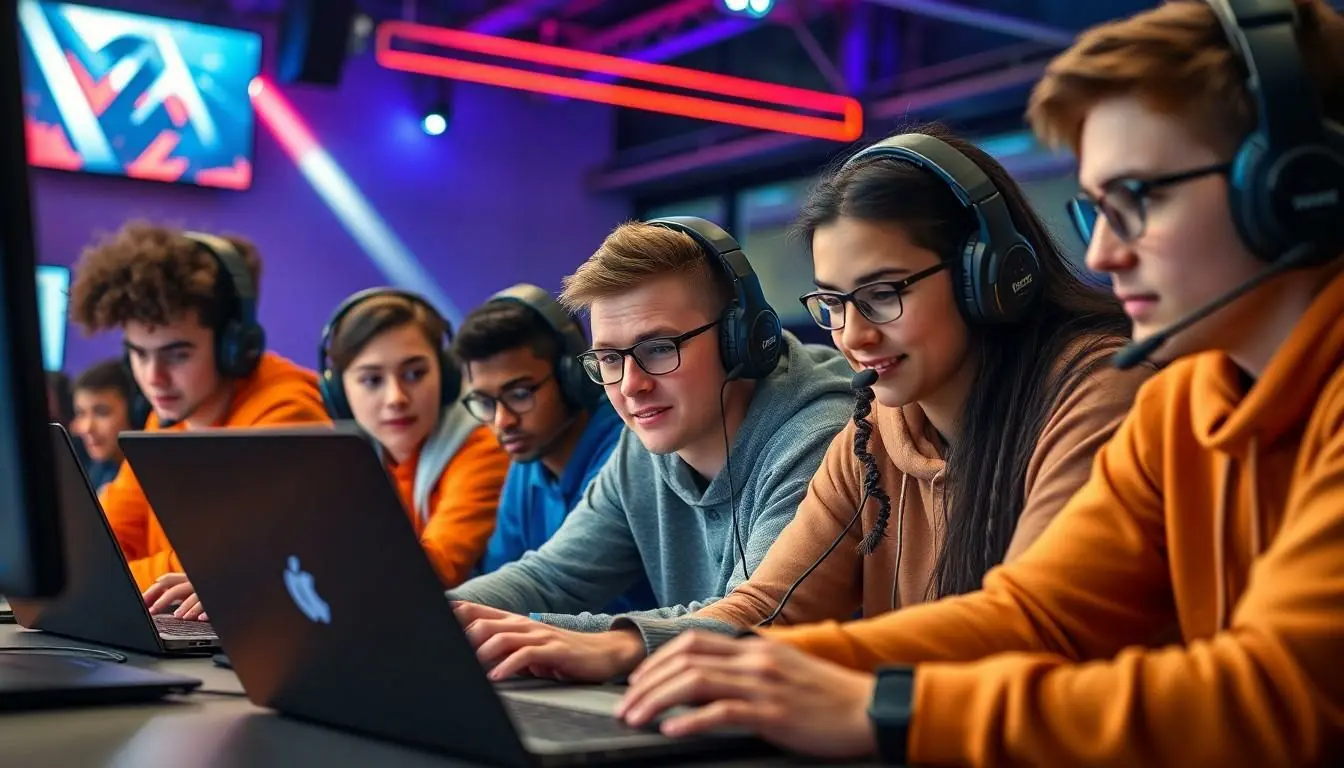Table of Contents
ToggleIn the world of higher education, textbooks and lectures are getting a serious upgrade. Enter collegiate esports—a phenomenon where students trade their backpacks for gaming headsets and classrooms for virtual arenas. It’s not just about playing games; it’s about teamwork, strategy, and, let’s be honest, a bit of friendly competition.
Overview of Collegiate Esports
Collegiate esports represents a significant shift in how students participate in competitive gaming at the higher education level. Competitive gaming fosters skills in teamwork, strategy, and critical thinking, which align with educational goals. Alongside this, institutions are developing programs that support gaming communities, including scholarships and varsity teams.
Data shows that over 200 colleges now offer esports programs, enhancing the collegiate experience for gamers. These programs not only allow students to improve their gaming skills but also prepare them for careers in technology and media. The National Association of Collegiate Esports (NACE) outlines benefits, including funding, coaching, and networking opportunities.
Participating in collegiate esports cultivates a sense of community among students, providing spaces for collaboration and social interaction. Many students find that engaging in esports helps reduce stress while enhancing academic performance. In this evolving landscape, academic institutions recognize the importance of integrating gaming into their curricula.
Schools see esports as an avenue to attract prospective students, particularly those interested in gaming culture. Creating dedicated esports facilities and arenas can elevate a school’s standing and provide practical experiences for students. With continued growth, collegiate esports is becoming a notable feature of modern education.
Growth of Collegiate Esports
Collegiate esports is experiencing remarkable growth, capturing the attention of academia and students alike. This development marks a shift in competitive engagement within higher education.
Rise in Popularity
Interest in collegiate esports surged dramatically in recent years. Over 200 colleges now offer structured esports programs, enabling students to participate in organized competitions. College students recognize that these programs teach valuable skills, fostering teamwork and strategic thinking. Esports has also attracted sponsorships and funding from major industry players, enhancing its legitimacy in the educational landscape. With more universities establishing dedicated teams and facilities, the excitement around collegiate competitive gaming continues to rise.
Impact of Pandemic on Growth
The COVID-19 pandemic accelerated the growth of collegiate esports. As in-person activities diminished, many institutions pivoted to virtual engagement, leading to increased participation in online gaming. Esports provided a social outlet, offering students a sense of community during isolation. Academic institutions embraced the shift, using esports as a tool to connect students and maintain engagement. Many universities reported a rise in interest in gaming programs, highlighting esports as a viable alternative for fostering student camaraderie and collaboration during challenging times.
Benefits of Collegiate Esports
Collegiate esports offers numerous advantages that enhance the student experience in higher education. These benefits range from academic gains to fostering a sense of community among participants.
Academic Advantages
Students engaged in collegiate esports demonstrate improved academic performance. Structured programs provide students with resources like coaching, mentorship, and scholarships. Participants often enhance skills like time management and strategic thinking, which are applicable in both gaming and academics. Research indicates that students involved in esports frequently maintain higher GPAs compared to their non-participating peers. Moreover, many institutions are integrating esports into their academic programs, offering courses focused on game design, technology, and digital marketing.
Social and Community Building
Collegiate esports cultivates strong social connections and community engagement among students. Teams foster a sense of belonging, promoting teamwork and collaboration. Participants often create lifelong friendships as they bond over shared goals and experiences. Events and tournaments facilitate networking opportunities, connecting students with peers and industry professionals. Esports also encourages inclusivity, welcoming diverse backgrounds and skill levels, which helps to break down social barriers. Overall, these social interactions contribute positively to students’ well-being and campus culture.
Challenges Facing Collegiate Esports
Collegiate esports faces a variety of challenges that can impact programs and participants. Identifying these obstacles is crucial for fostering a thriving esports environment in higher education.
Funding and Sponsorship Issues
Funding remains a significant hurdle for collegiate esports programs. Many universities struggle to secure sponsorships or financial support, which limits resources for equipment, facilities, and team travel. Without adequate funding, programs risk facing operational challenges that could affect their viability. Some institutions may also find it difficult to allocate budgets specifically for esports. Seeking partnerships with gaming companies or local businesses can provide potential solutions. Establishing strong community ties often opens doors to financial backing and promotional opportunities for programs.
Balancing Academics and Competition
Balancing academics with competitive gaming presents challenges for student-athletes. Students often grapple with their time management skills while navigating rigorous academic schedules alongside team practices and competitions. Prioritizing studies can become difficult during peak tournament seasons, potentially leading to academic stress. Institutions can support students by emphasizing the importance of academic commitments and offering flexible scheduling for esports activities. Consistent communication between coaches and academic advisors facilitates better support systems. Ultimately, developing effective time management strategies benefits both academic performance and gaming success.
Future of Collegiate Esports
Collegiate esports continues to attract attention as it evolves within higher education. Various trends shape the landscape of this dynamic field.
Trends to Watch
Growth in streaming platforms enhances visibility for esports programs. Increased investments from universities drive improved training facilities and resources. Schools value inclusivity, leading to diverse team compositions that encourage participation from all backgrounds. Enhanced collaboration with gaming companies opens doors for sponsorships and funding opportunities. More institutions recognize the importance of integrating esports into their academic offerings and campus activities. As the competitive landscape expands, the structure of tournaments and leagues may change, creating new formats and engagement models.
Potential for Professional Pathways
Professional esports careers become increasingly viable for students engaged in collegiate programs. Competitors often catch the eye of scouting teams from professional organizations. Many universities emphasize skills that extend beyond gameplay, like teamwork, leadership, and strategic thinking. Networking opportunities during events connect students with industry professionals and mentors. Internship possibilities emerge from collaborations between educational institutions and gaming companies, offering further industry exposure. Career services often adapt to include resources designed specifically for aspiring esports professionals, ensuring a well-rounded preparation.
Conclusion
Collegiate esports is reshaping the landscape of higher education by merging competitive gaming with academic growth. As more institutions embrace this trend, students gain valuable skills that extend beyond the screen. The benefits of teamwork, strategic thinking, and networking are fostering a community that enhances student life.
Challenges remain, particularly regarding funding and balancing academics with esports commitments. However, with the right support and resources, collegiate esports can thrive and continue to attract a diverse range of students. The future looks promising as universities invest in facilities and partnerships, paving the way for new opportunities in both education and professional gaming.





